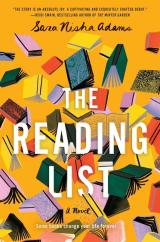Aleisha is a bright but anxious teenager working at the local library for the summer when she discovers a crumpled-up piece of paper in the back of To Kill a Mockingbird. It’s a list of novels that she’s never heard of before. Intrigued, and a little bored with her slow job at the checkout desk, she impulsively decides to read every book on the list, one after the other. As each story gives up its magic, the books transport Aleisha from the painful realities she’s facing at home.
When Mukesh arrives at the library, desperate to forge a connection with his bookworm granddaughter, Aleisha passes along the reading list…hoping that it will be a lifeline for him too. Slowly, the shared books create a connection between two lonely souls, as fiction helps them escape their grief and everyday troubles and find joy again.
Comment: I've decided to add this book to my TBR because it would be a book featuring a library and that means, obviously, book talk!
This is the author's debut and it has received a lot of praise. I see why, because the writing feels quite mature and the story has many appealing elements, namely the conversations about books and the use of specific titles to advance certain ideas on this story. This tells me the author not only read the books referenced but wanted to use them as an important part of this plot, which is always such a treat for any book lover.
In fact, the book talk was definitely my favorite part of the story and I had a great time anticipating what characters would think while reading this and that novel and it helped a lot that I have read most of the books mentioned myself. In the beginning, and as the first pages went on, I thought the book would be about the two main characters' journey and how the love of books would bring them together so they could help save the library, which we are told has had difficulties and might be closed one day.
However, the tone of this book seemed to change from situation to situation, in particular when it came to Aleisha's mother. She seemed to have been portrayed as dealing with depression - never was this word used to diagnose her, I only infer from her behavior - and in part, that was because Aleisha's father left them to be with someone else and he has a new family. I did wonder if Aleisha's mother was a "tool" to show her she would need to do her own path or that perhaps she would need to help her mother and the novels would have some sort of "moral lesson" which would be the turning point for their family life.
Mukesh' side of the story is sad in parts too, he lost his beloved wife and feels too lonely. He is clearly of Indian origin and there are many references to cultural aspects, namely how he is sen by being friends with another older woman, who used to be his wife's friend. They are good companions and I don't think there's any hint they would be more than that but people in their community talk. I found this interesting and not that different from any other cultural background but I confess I was more focused on what kind of opinion Mukesh would have on the books he was reading and what they meant for him.
Although this might not be the best percentage, I'd say that until 70 or 75% of the novel, this was generic enough to make me happy about the book talk, but especially Aleisha's life at home was stressed out enough to suggest something wasn't quite right. At that moment, something huge happens and the tone becomes way darker, in the sense, more importance is given to the plot points and not as much the reading list and the experience the main characters were having. I still can't really explain why the author might have decided to use that situation but, no matter how realistic and emotional, I was still caught by surprise by how dark it was, I really imagined the idea would be to take the characters in a more hopeful path towards the end.
After some complicated scenes, situations, chapters, the focus goes back to help the library and Aleisha and Mukesh once more join forces, with other library members, to do something so that everyone can see the importance of the library and how it makes a difference in many people's lives, even if the numbers themselves seem low. I obviously liked this as a way to sort of take the story to its end, but what had happened before affected my enjoyment. I suppose that was the goal but... I think the two main subjects (which I now feel this second huge event ended up being, along with the save the library thing) don't mesh that easily and I feel the story became too dramatic and complicated so quickly.
The last part of the story solves many loose points but I confess I don't find that to be uplifting, as I imagined it could be, considering how Aleisha and Mukesh, from different generations found common ground in books and how they can be timeless in how different people can like or dislike the same books for the same reasons. I think the big event sent the wrong message in what it meant for the ones immediately affected by it. I think it seemed as if it solved some things when it shouldn't be necessary for the author to rely on that for those reasons.

No comments:
Post a Comment